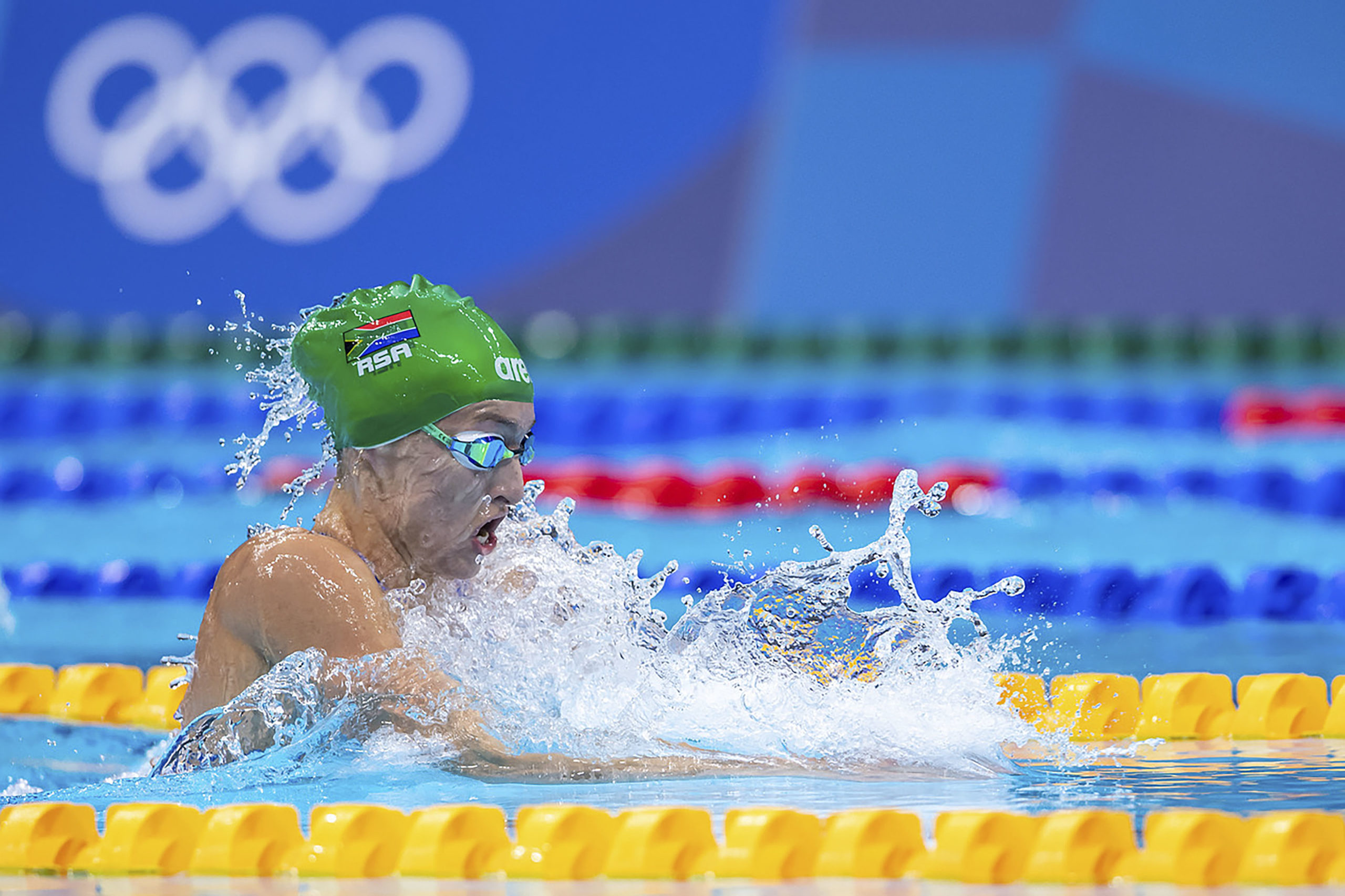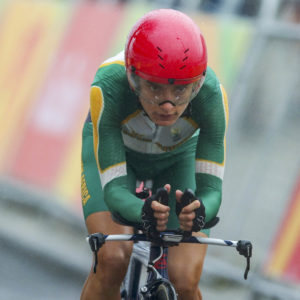Tatjana Schoenmaker’s Tokyo delight
The South African sensation had to ‘learn to love swimming again’ after missing out on Rio, but her efforts were rewarded with gold and a new world record at the Olympics in Japan.
Author:
30 July 2021

Just one-hundredth of a second nearly brought Tatjana Schoenmaker’s career to a crashing end. It was 2016 and the young breaststroker had big Olympic dreams, but fell short of qualifying by just one agonising split second. It meant she wouldn’t be packing her bags for the Rio Summer Olympic Games that year.
Thoughts crowded her head of giving up for good. Was it all worth it?
It took five years and many, many kilometres of training, but she got her answer on a cloudy morning in Tokyo on Friday 30 July: gold in world-record time for the 200m breaststroke.

It was South Africa’s first gold medal at the 2020 Olympic Games, and the first world record set by a South African woman in a quarter-century. It was also the only individual world record that had been set in the Tokyo pool up to this point. And it came after Schoenmaker won silver in the 100m breaststroke three days earlier.
“2016 was unfortunate because I missed qualification by one split second on the day. It did suck and it wasn’t a very happy moment. But I know everything happens for a reason and to be honest, I wasn’t really ready at that time,” said Schoenmaker, with the Olympic 200m breaststroke gold medal now firmly round her neck.
“I kind of had a dip. I think creating so much expectation … When you don’t hit that expectation you fall, and I think my fall was quite big. I had to start learning to love the sport again and knowing that my goal was 2020.”
Schoenmaker’s coach, Rocco Meiring, had recently returned from a stint in Canada and had a few words with the young swimmer. He could see the potential.
“I remember sitting with her and trying to convince her to continue,” he said after Friday’s race. “I wasn’t part of that initial journey, but I’m obviously very proud now that we could turn it around because I didn’t make her promises. But I told her it was worth it for her to go on and not to stop. I feel very proud and I feel very relieved,” he added, wiping away tears.
Coaching credit
Meiring is credited with much of the resurgence in women’s swimming in South Africa. While the likes of Chad le Clos and Cameron van der Burgh have kept the flag flying on swimming podiums around the world, not since Penny Heyns in 2000 has a South African woman left an Olympics with a medal. Now Schoenmaker has two and the other swimmer Meiring coaches, Kaylene Corbett, comes away with a highly creditable fifth-place finish in an Olympic final.
Schoenmaker is 24 and Corbett just 22, so both swimmers have bright futures ahead of them. And in a country rocked by allegations and continuing investigations of abuse by coaches, their success is a hugely welcome change.
Their “good relationship” is what makes Meiring unique, according to Schoenmaker. “He’s obviously also really good with female swimmers, not that he’s not good with the men. I think because he has daughters himself, he has a soft spot for the girls. I think any coach can be amazing if you have the right communication with them and trust them. Just knowing that he’s 100% honest with me and I’m 100% honest with him, I feel that’s what works for us.”
“Rocco is an incredible coach,” Corbett added, “because he sees the person behind the scenes. He doesn’t just see the athlete … A lot of swimmers and athletes struggle with mental health and things like that. So for athletes to be taken care of, especially by a coach that actually sees you as another person behind the swimmer, is really, really important. He makes sure that not only your physical body is conditioned, but that you’re also mentally and spiritually conditioned for a big event like this.”
Related article:
It doesn’t get any bigger than the Olympics, where withstanding the pressure of the moment is key. For Schoenmaker, that meant turning off her phone and shutting out the world for a while.
“I really put my phone to the side. There’s only been positive messages of good luck and stuff, but the more you read it the more excited you get and the more expectations you create for yourself. So, last night was the first time I fell asleep without thinking about the race. I had an amazing sleep. I was able to just sleep and really have peace for whatever happened in that final. I could walk out knowing I gave it my all.”
In awe
The Pretoria-based swimmer will never say out loud that she was in Tokyo to win a gold medal. There’s never fighting talk or bold predictions. It’s always about doing her best and giving the glory to God. While that can be frustrating for the media, hungry for a feisty line, it’s clearly what works for her. And it’s what propelled her to the gold while shattering a record that had stood for eight years.
Even her rivals – the famously big-talking American Lilly King, who claimed silver in the race, and her compatriot Annie Lazor, who took the bronze, were in awe of Schoenmaker’s achievement.
“The Olympics is a very difficult meet to set a world record at. Speaking from experience, I did not do it at Rio. I did it the year after in Budapest,” said King, who holds the 100m breaststroke world record. “There are a lot of factors that go into setting a world record at the Olympics. There are a lot of outside things. You’re not sure of the food, you’re walking a lot more than you normally would. The pressure is a lot higher than it normally is, and then on top of that we’re swimming in the morning here. So obviously that didn’t matter for Tatjana. She did it and it was awesome.”
“I really think that it’s so incredible that she did it when it mattered,” added Lazor. “I kind of knew she would maybe do it. She had a great prelims and semi swim. Just to be able to be next to her in that moment, it’s just incredible. No response to it at all except that it was a phenomenal swim.
“A couple of people have knocked on 2:19 for a while, so for her to smash through a 2:18, I think she’s really setting a precedent for people to come. It’s kind of like the guy who broke the four-minute mile for the first time. Once one guy does it, the precedent is set for others to do it as well,” she said about Schoenmaker’s record of 2:18.95
Uniting nations
With her rivals singing her praises, there was a distinctly different atmosphere around the race. Five years ago, King famously made waves by wagging a finger at Russian swimmer Yulia Efimova, who had served a doping ban but was still allowed to swim in Rio. She was vocal about that situation, vocal on how she thought the American women could dominate the Tokyo Olympics. She’s vocal about most things. But this time it was different. Corbett even commented on what an incredible atmosphere there was in the call room before the swimmers walked out on the pool deck for the final.
“It was so amazing – a lot of the girls admitted it afterwards as well – this was one of the most relaxed call rooms we’ve been in. We were chatting, all of us were just having a party behind the scenes, so to be able to share that with friends now, I think that’s how amazing sport is to unite nations,” she said.
King agreed. “It was just a good group of people. I think 200 breaststrokers all bond over the pain of it. I just wanted to be relaxed and chatty, so it was a good vibe.”
Related article:
It’s difficult not to think that it’s the devout Schoenmaker’s positive and calm influence on proceedings that’s made all the difference. She constantly downplays her achievements and always gives the credit to God. “Out of this, if people can see the goodness of God, then I came here for that. He gave me the talent and I was able to use it at my best,” she said, summing up her attitude to these Games.
Heyns was also known for her Christian faith, which clearly worked for her too. She’s still the only woman in Olympic history to have won gold in both the 100m and 200m breaststroke events, although that record could well be under threat from her compatriot come Paris 2024.
Home time
When asked, Heyns offered this advice for Schoenmaker: “If I look back, I think I made some mistakes. Obviously, South Africa was in a different place back then. Nobody knew what to do and neither did I. I really should have taken a break and allowed myself to just enjoy it and then come back. My sense was immediately, what if I don’t do it again? Now, I don’t know if Tatjana is feeling that, but I would think the difference is the next Olympics is within three years, so that’s good for her. The difference is also that she’s more mature, she’s a little older than I was, so her and Rocco have already spoken about this.
“They already have a plan for her to rest, step back. I think they may have learnt some lessons from Chad also over the years, and Cameron, so they know how to handle it a bit better. Certainly, you need to take a mental break, take a step back and not get into that mindset of, if I don’t perform at the same level in my next race then it’s over … She needs to surround herself with the right people who will protect her and who aren’t there to associate with her for what they can get, especially as a girl.
“It’s not like this result is out of the blue. She does have a team around her already. I think they’ve managed her success really well post-Commonwealths and I think they’ll be okay.”
Related article:
All Schoenmaker wants to do now is get home to celebrate with her family and friends, who couldn’t travel to Japan because of the Covid-induced ban on spectators. “I just want to give my parents a hug. I think the reality will kick in when I get home,” she said.
Le Clos was famously asked to a matric dance by a fan waiting at the airport when he returned, victorious, from the 2012 Olympics. Reminded of that, Schoenmaker threw her head back with her characteristic laugh. “I’m a bit old,” she quipped. “But if anyone wants to, I’m here. I wouldn’t mind dressing up.”
She’s got a lovely gold accessory to go with any outfit now.




